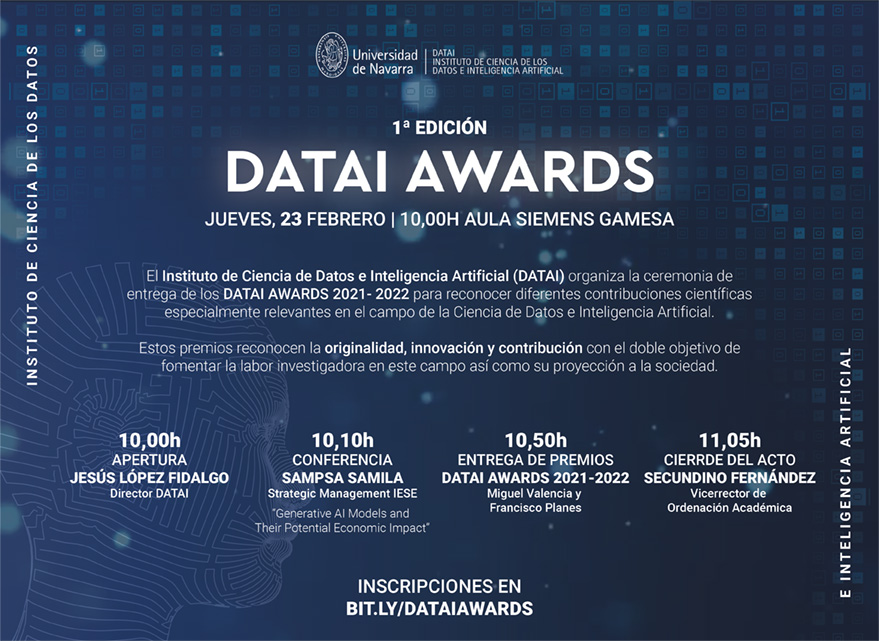Ceremonia de premios

El próximo Jueves 23 de Febrero 2023 tendrá lugar la 1ª Ceremonia de Premios DATAI. Será a las 10.00h en el Aula Siemens Gamesa (Edificio ICS).
Contaremos con la presencia de Sampsa Samila (IESE), miembro asociado y coordinador del grupo IESE en DATAI, con la conferencia "Generative AI Models and Their Potential Economic Impact ''.
Francis Planes y Miguel Valencia recibirán esta distinción en la 1ª Ceremonia de Premios DATAI.

The Institute of Data Science and Artificial Intelligence (DATAI) launches the 2021-2022 DATAI Awards with the objective of rewarding particularly relevant scientific contributions in the field of Data Science and Artificial Intelligence. The prizes awarded under this call recognize originality, innovation and contribution, with the dual goal of encouraging research in this field as well as its dissemination to society.
A maximum of two prizes will be awarded in this call, each with a 3.000-euro endowment to help with the development of a research project. Award-winning contributions must be pioneering and influential in international research. If the prize is awarded to an application submitted by two or more members of the Institute, only one of them will act as the person responsible of the application.
The awards are intended for DATAI member researchers in any of its modalities, whether full, associated or invited members. DATAI will be mentioned among the authors' affiliations in the contribution, but not in the acknowledgments.
All the necessary documentation related to the 2021-2022 DATAI Awards will be sent in digital format to the DATAI email address datai@unav.es from December 20, 2021 until August 30, 2022.
The announcement of the awards will be resolved before October 30, 2022.
DOWNLOADS
The scientific committee of the Institute of Data Science and Artificial Intelligence (DATAI) has made a decision for the evaluation of the 2021-2022 DATAI Awards.
SCIENTIFIC COMMITTEE MEMBERS:
-
Amparo Alonso Betanzos - Universidade da Coruña
-
Enrique del Castillo - The Pennsylvania State University
-
John Stufken - George Mason University
The committee wants to stress all the papers in the competition were very interesting. It was not easy to evaluate the papers since they came from different areas.
AWARD
Applied contribution with an impact in the social sphere, innovation or knowledge transfer
MIGUEL VALENCIA USTARROZ
Contribution: An interactive framework for the detection of ictal and interictal activities: Cross-species and stand-alone implementation.
Author(s): Guillermo M. Besné, Alejandro Horrillo-Maysonnial, María Jesús Nicolás, Ferran Capell-Pascual, Elena Urrestarazu, Julio Artieda, Miguel Valencia
Brief description of the qualities motivating the award: This work uses canned Matlab ML functions to implement 6 different ML methods for the detection of events from EEG data. The authors analyze the signals both in the time and frequency domain. It is an interdisciplinary work, which gives it an added value. They build customized ML models for the detection of ictal and interictal activities for the automatic annotation of epileptic traits based on electrophysiological recordings. It appears to require considerable input from the user, although the claim is made that the interactive app is simpler than available methods.
AWARD
Methodological contribution
FRANCISCO PLANES PEDREÑO
Contribution: BOSO: A novel feature selection algorithm for linear regression with high-dimensional data.
Author(s): Luis V. Valcárcel, Edurne San José-Enériz, Xabier Cendoya, Ángel Rubio, Xabier Agirre, Felipe Prósper, Francisco J. Planes
Brief description of the qualities motivating the award: The paper presents a new method for feature selection in high dimensional regression, and empirically demonstrates based on synthetic datasets how it works better than Lasso, forward selection, best subsets, and the relaxed lasso methods. It performs very well for data that can be modeled by a linear regression model. The broad applicability makes this an appealing work.



